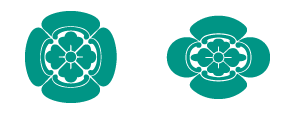|
||
 |
||

(C)2001 Japanese Architecture and Art Net Users System. No reproduction or republication without written permission.
掲載のテキスト・写真・イラストなど、全てのコンテンツの無断複製・転載を禁じます。
|
||||||
| mokkou 木瓜 | ||||||
| KEY WORD : art history / paintings | ||||||
| Also mokkougata 木瓜形, kamon か文. A decorative pattern shaped like a flower with an oval center and four petals. It originated in Tang dynasty as a motif on courtiers' clothes and was very popular in the Heian period in Japan for decorating clothing, furniture, and household utensils. A simplified mokkou pattern is used on carved ballustrades *mokkougata ranma 木瓜形欄間. | ||||||
 |
||||||
| REFERENCES: | ||||||
| EXTERNAL LINKS: | ||||||
| NOTES: | ||||||
(C)2001 Japanese Architecture and Art Net Users System. No reproduction or republication without written permission. 掲載のテキスト・写真・イラストなど、全てのコンテンツの無断複製・転載を禁じます。 |
||||||